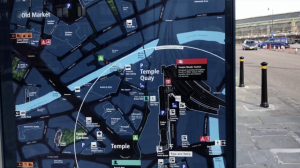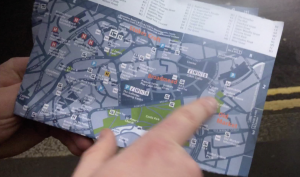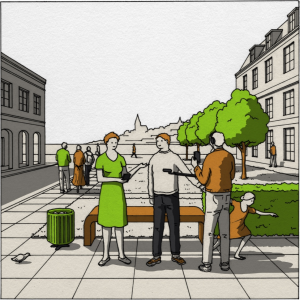A pioneering signposting and information scheme that helps visitors find their way around Bristol is to be updated by the city-based agency that helped launch it 25 years ago along with a specialist design firm also based in the city.
Bristol Legible City initiative was conceived in 1996 by Bristol City Council and specialist place branding and wayfinding firm City ID to improve the way people understand and experience the city. 
Its integrated environmental identity, signage and information – including direction signs, on-street information panels, pictured, with city and area maps, printed walking maps, visitor information identity and arts projects – are now part of the city landscape but was viewed as revolutionary at the time.
While the scheme has been replicated around the world over the intervening 25 years, Bristol’s original hardware has barely been touched and now badly needs an upgrade.
The city council has now called in specialist design firm Mace & Menter to use its expertise to establish where investment needs to be made and how the system can be revamped and improved for the digital age, with City ID carrying out the work.
Mace & Menter’s research team was tasked with considering visitors’ whole experience of navigating around Bristol from multiple perspectives, using a mix of research methods, including observational research, in-depth interviews and surveys with visitors, locals, business owners and the organisations set up to represent them.
Despite the prevalence of smart phones, Mace & Menter’s research team to consider the visitor’s whole experience of navigating Bristol, from multiple perspectives.
Using a mix of research methods, including observational research, in-depth interviews and surveys with visitors, locals, business owners and the organisations set up to represent them, the team set out to understand that experience.
The research showed that more than half of the visitors use the Legible City system to find their way around and 97% of those found it helpful.
Despite most visitors having smart phones, nearly a quarter relied completely on the signs and maps.
And while many visitors used Google Maps, they tended to have a much harder time trying to find their way around. For example, digital systems do not usually recommend the most scenic route or show how to avoid crossing busy roads.
The research also uncovered a significant number of unmet needs, including:
While visitors can easily find their way to areas which have been recommended to them, they have no way of knowing where to go next
Business owners want their neighbourhoods to have stronger identities and better linkages between the beating hearts of the city
Locals and business owners want the city to take a stronger role in transforming public spaces into welcoming, bustling thoroughfares.
As a result, the outline plan for the project’s future will be based on supporting the local economy by encouraging visitors and residents to explore and rediscover Bristol’s cultural heritage and retail offering. 
The street signs will be upgraded to feature illuminated, updated mapping highlighting what the city has to offer while digital mapping products will be introduced to give a live view of what’s going on in the city and how to access events and destinations via their phones/devices.
The popular free paper map of the city, pictured, will also be re-designed and re-issued to help people find their way around by foot and bike.
Bristol Legible City project manager Nat Roberton said “All of this falls solidly into Legible City’s remit and is a far cry from the concerns at the beginning of the project.
“The team started with the possibility that the scheme had outlived its usefulness and ended with a vision for Bristol’s Legible City scheme that will return it to its visionary origins.”
Mace & Menter founder and managing director Sam Menter added: “Crafting a public space and wayfinding system for Bristol that meets all of those needs will be an ongoing journey, but the Legible City team now has a solid, evidence-based foundation for the recommendations it puts forward and decisions it will go on to make.”
Mace & Menter specialises in service design and user experience for complex services, combining behavioural insight – from primary research – with interaction, mobile and web design expertise to create evidence-driven digital services.
The team works with organisations – such as the Cabinet Office, DCMS, Policy Lab, Scope and the V&A – that want to significantly improve the way people experience their services.






























